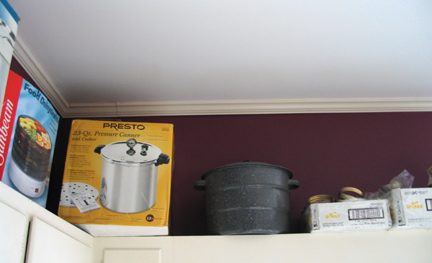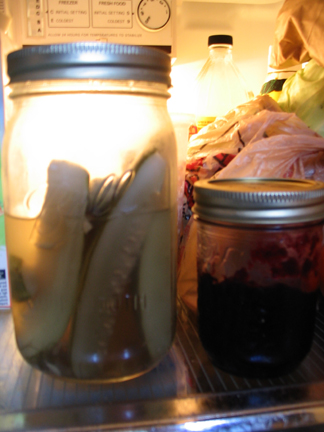Preserving knowledge
I opened my first jar of homemade vinegar dill pickles, one of the quarts I put up a few weeks ago from the Black River Organic Farm cucumbers. The first pickle out of the jar was nice and crisp, if only a bit wobbly, probably due to the fact that I didn’t bother to put Pickle Crisp in the recipe. I really don’t care about the aesthetics right now, as long as the pickles came out okay and don’t kill me.
I made two different batches, one with regular white vinegar and the other with apple cider vinegar. The apple cider vinegar pickles might be an acquired taste just like the vinegar itself. They are a little tangier and have more of a vinegar aftertaste unlike the white vinegar pickles. Again, I don’t mind as long as they don’t kill me.
Kristin and I have had canning paraphernalia around our various houses for the past three or four years, purchased under the assumption that each summer was going to be the summer where we preserved a bunch of food. We have the regular hot water bath canner as well as a pressure canner. On top of the kitchen cupboards are boxes of various sized jars, picked up from Big Lots, yard sales and some area thrift stores.

Kristin and I went to a Saturday morning canning workshop quite a few years ago and made pickled pears. We learned the process and theory behind canning with both boiling water and pressure. It seemed simple enough, although someone was holding our hands throughout. We came home and said that we would get right on it and start canning our own stuff. And then we didn’t, and the years went by.
The 100 mile diet project got me back in the mindset of preserving food by canning. This time there wouldn’t be excuses because I was going to need local food when local food wasn’t growing. I dove in on the pickles and basically spent a day teaching myself how to go through the process.
It was brutal. The second guessing was rampant; I had no idea if what I was doing was correct. I was using a recipe given to me by John and Belle Shisko, an older couple who sell various produce items like chestnuts, kale and figs to the co-op. I didn’t know if the proportions were right with the vinegar, if I needed sugar or not, how long to process, and on and on. The recipe and my source book Putting Food By had different methods than all the Internet sources I found. I decided just to stick with the recipe. The Shiskos are in their 90s, so the recipe couldn’t be too detrimental to my health.
The funny thing about all this is that both of my parents can food every year, or at least used to. My mom works primarily with jams and my dad does spaghetti sauce from his garden tomatoes. Yet neither of my folks thought to teach me this basic process, and I never thought to ask them to teach me. I seemed content to watch or walk in and out on the process. Now when I need the knowledge, I have to plow through a book instead of relying on passed on skills.
It seems this way with a great many things, things our parents or other family members knew how to do with some competency or even with great skill, yet these things are not passed on to a willing, able, and many times enthusiastic next generation. My grandfather was an amazing welder, practically inventing aluminum welding during World War Two. But I don’t know how to weld, never even held a welding stick during countless visits to his shop as a kid and as a young adult. The offer was never made, the desire on my part never expressed, and the fault of dropped knowledge was spread among all those involved.
It has been my intentionand practice for quite sometime to teach and pass on as much of the information and skills I have to anyone who will read or listen or follow along. It is also my intention to never let an opportunity for learning, for adventure, for submerging in tangible skill building exercises in everything from identifying wild edibles to fixing a lawnmower, pass me by. I encourage skill sharing among other folks I know, engage in mutual aid whenever possible and spread the DIY ethic in my daily life. In whatever we are dealing with, more community and more cooperation and more learning from others is never a bad thing.
Anyway, back to the pickles…
Recipe for Kosher Dill Pickles (Warning, the salt and vinegar may or may not be found locally produced. I had a bunch in the stockpiles.) –
1 – Wash jars; heat lids and rings in water not quite to boiling and leave in hot water until needed. Add water to canner (a little more than half full if using quarts, more for pints because they displace less water when added to the canner) and begin to heat.
2 – Boil the following ingredients, then set aside. This is enough to fill approximately 7 quart sized canning jars.
9 cups water
3 cups white vinegar or apple cider vinegar
1/4 cup Kosher salt
3 – In each canning jar place the following ingredients.
4 slices of garlic, two on bottom two on top
2 sprigs dill
optional – 4 peppercorns
cucumbers, whole or sliced lengthwise or rounds
4 – Place filled, tightly closed jars into warm/hot water in canner. Water should be several inches above the lids of the jars.
5 – Cover the canner and bring water to a boil.
6 – Reduce heat to medium and boil for 9 minutes being careful to keep the water between 180 and 185 degrees.
7 – Remove the jars and set aside to cool overnight. Test the seals by making sure they aren’t popped up and remove the rings so they do not rust. Store pickles in a cool place.
Recipe from John and Belle Shisko with canning embellishments by me.

The real test of the pickles was taking a quart to dinner at a friends house. Everyone ate at least two, and I considered that a success. Now on the next project…sauerkraut.
July 6, 2007 at 4:37 pm
it was fun reading..I can often and I had forgotten how daunting it can be at first!
July 8, 2007 at 12:44 pm
I wonder sometimes if one day no one will remember how to do certain things. Books might help, but they are no substitute for hands on training with some master of a craft. I only wish I could learn from my mom the details & tricks to quilting that she knows…. alas things like work & life get in the way. Why is it in a day of some many conveniences that no one has much time? Glad you are do this. Its inspiring.
July 10, 2007 at 12:51 pm
Hey Trace! Love what you’ve been doing lately. I’d eat your preserves! I made sweet and hot curried squash pickles last week – if you like fire in your mouth, grab the recipe off my blog and give them a go. Did you ever try making the beet sugar then? Just curious.
I made sweet and hot curried squash pickles last week – if you like fire in your mouth, grab the recipe off my blog and give them a go. Did you ever try making the beet sugar then? Just curious.